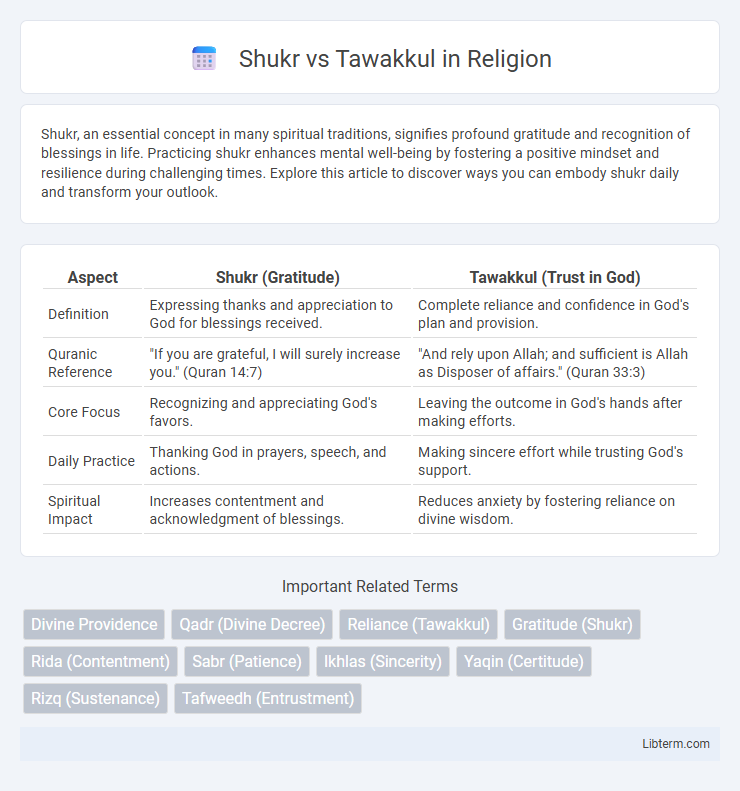Shukr, an essential concept in many spiritual traditions, signifies profound gratitude and recognition of blessings in life. Practicing shukr enhances mental well-being by fostering a positive mindset and resilience during challenging times. Explore this article to discover ways you can embody shukr daily and transform your outlook.
Table of Comparison
| Aspect | Shukr (Gratitude) | Tawakkul (Trust in God) |
|---|---|---|
| Definition | Expressing thanks and appreciation to God for blessings received. | Complete reliance and confidence in God's plan and provision. |
| Quranic Reference | "If you are grateful, I will surely increase you." (Quran 14:7) | "And rely upon Allah; and sufficient is Allah as Disposer of affairs." (Quran 33:3) |
| Core Focus | Recognizing and appreciating God's favors. | Leaving the outcome in God's hands after making efforts. |
| Daily Practice | Thanking God in prayers, speech, and actions. | Making sincere effort while trusting God's support. |
| Spiritual Impact | Increases contentment and acknowledgment of blessings. | Reduces anxiety by fostering reliance on divine wisdom. |
Understanding Shukr: The Essence of Gratitude
Shukr embodies deep gratitude by recognizing and appreciating Allah's countless blessings, fostering a sincere heart and contentment with divine provisions. This spiritual practice extends beyond mere thankfulness, intertwining with Tawakkul, which emphasizes complete reliance on Allah's wisdom and timing. Understanding Shukr as the essence of gratitude enriches one's faith, encouraging a positive outlook and trust in divine mercy amidst life's challenges.
Defining Tawakkul: The Art of Trusting Allah
Tawakkul, the art of trusting Allah, means placing complete reliance on His wisdom and power while taking necessary actions. It embodies a balanced approach where faith intersects with effort, highlighting surrender to Allah's decree without neglecting personal responsibility. Unlike mere gratitude (Shukr), Tawakkul involves a profound spiritual trust, confident that Allah's plan is best regardless of outcomes.
Quranic Foundations of Shukr and Tawakkul
Shukr and Tawakkul are foundational concepts in the Quran that emphasize gratitude and trust in Allah's plan. Shukr is rooted in verses such as 14:7, where Allah promises to increase blessings for those who give thanks, highlighting the reciprocal nature of gratitude. Tawakkul is exemplified in Quran 3:159 and 65:3, where believers are encouraged to place full reliance on Allah while also taking practical steps, combining trust with action as a means of achieving success.
Shukr in Daily Life: Practical Applications
Shukr, or gratitude, manifests in daily life through mindful appreciation of small blessings like health, family, and sustenance, fostering a positive mindset and emotional resilience. Practicing shukr encourages proactive actions such as helping others, recognizing opportunities, and maintaining patience during challenges, which enhances overall well-being and social harmony. Unlike tawakkul, which centers on reliance on divine will, shukr actively engages individuals in acknowledging and responding to the abundance in their lives.
How Tawakkul Shapes Our Attitude Towards Challenges
Tawakkul, the Islamic concept of trust in Allah, cultivates resilience and patience in facing life's challenges by instilling confidence that outcomes are under divine control. This trust reduces anxiety and empowers individuals to take proactive steps while surrendering the results to Allah's wisdom. Unlike Shukr, which centers on gratitude for blessings, Tawakkul specifically shapes a steadfast attitude during adversity by balancing reliance on effort with spiritual surrender.
Key Differences Between Shukr and Tawakkul
Shukr involves expressing gratitude to Allah for blessings received, emphasizing recognition and appreciation of His favors. Tawakkul signifies reliance and trust in Allah's plan while taking necessary actions, highlighting surrender and confidence in divine wisdom amid uncertainty. The key difference lies in Shukr as a form of thankfulness for past or present blessings, whereas Tawakkul is active trust in Allah's guidance for future outcomes.
The Interdependence of Gratitude and Reliance
Gratitude (Shukr) and reliance (Tawakkul) are deeply interconnected concepts in Islamic spirituality, where expressing sincere thanks to Allah enhances one's trust in His wisdom and provision. Shukr nurtures a believer's awareness of blessings, reinforcing Tawakkul by fostering reliance on divine mercy rather than solely personal effort. This interdependence creates a balanced spiritual framework, encouraging continuous hope and contentment through mindful appreciation and surrender to Allah's decrees.
Shukr and Tawakkul in the Sunnah of the Prophet
Shukr and Tawakkul are essential concepts in the Sunnah of the Prophet Muhammad (peace be upon him), where Shukr emphasizes expressing gratitude to Allah for His countless blessings through words, actions, and devotion, while Tawakkul involves complete reliance and trust in Allah's plan after making sincere efforts. The Prophet consistently demonstrated Shukr by praising Allah in times of ease and hardship, signifying a heart mindful of divine favor, while his practice of Tawakkul showed unwavering confidence in Allah's support regardless of situational challenges. Together, these virtues cultivate spiritual resilience and deepen a believer's connection to Allah by balancing gratefulness with trust in divine wisdom.
Spiritual Benefits of Practicing Shukr and Tawakkul
Practicing Shukr cultivates a deep sense of gratitude that enhances mental well-being by fostering contentment and reducing anxiety. Tawakkul, or reliance on God, strengthens spiritual resilience and promotes inner peace by encouraging trust in divine wisdom during life's uncertainties. Together, Shukr and Tawakkul create a balanced spiritual state that nurtures humility, patience, and a profound connection with faith.
Cultivating Shukr and Tawakkul: Steps for Personal Growth
Cultivating Shukr involves daily practices like expressing gratitude through prayer, journaling blessings, and acknowledging both small and significant positive experiences, which reinforces a positive mindset and spiritual contentment. Tawakkul requires placing trust in divine wisdom while actively taking responsible actions, balancing faith with effort by setting realistic goals and seeking guidance during uncertainties. Integrating these steps fosters resilience and inner peace by harmonizing gratefulness with reliance on God's plan in personal growth.
Shukr Infographic

 libterm.com
libterm.com